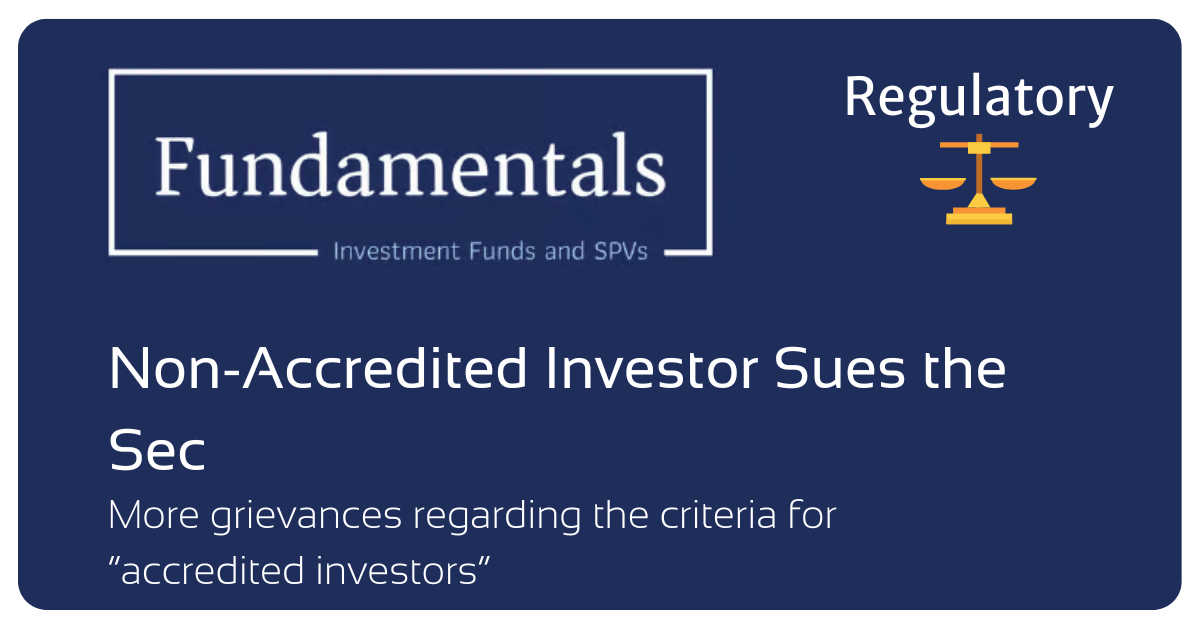- Fundamentals
- Posts
- ⚖️ Non-Accredited Investor Sues the SEC
⚖️ Non-Accredited Investor Sues the SEC
More grievances regarding the criteria for "accredited investors"

🎉 Happy Friday, funds family!
Today, we’ll discuss a recent lawsuit filed against the SEC by an almost-accredited investor who wanted to invest in a venture capital fund, but was declined.
But first…
/ SELF PROMOTION

If you’re a sponsor (GP) raising an investment fund or syndication in private equity, private credit, real estate, or venture capital, we may be a good fit for you. We also represent limited partners (LPs) investing in funds and syndications.
Thanks for reading. Now, let’s jump into the article 😃
📃 What’s the case, your honor?
🔗 Kapszukiewicz v. United States Securities and Exchange Commission is the official name of the case, which was filed by plaintiff Emily Kapszukiewicz. Emily is an economist who earns ~$195,000 a year and has a net worth of ~$850,000. She has a master’s degree in applied economics and experience with financial modeling.
If you’ve read our article on ⚖️ The Securities Act of 1933 , then you know her income and net worth are just shy of the $200k income and $1 million net worth thresholds for individual accredited investors.
But there’s no “almost” in securities laws! Emily tried to invest around $25,000 in a series of Healthcare Shares LP, a venture fund investing in healthcare.
🧑⚖️ We object! (to unfair securities laws)
The plaintiffs advance three main claims:
Arbitrary and Capricious: The SEC has never shown that wealth or income reliably track investor sophistication. The thresholds, set decades ago, have barely evolved.
Constitutional Concerns: Limiting who can invest restricts expressive and associational rights — choosing where to place capital can itself be a form of speech and association.
Disparate Impact: By tethering access to wealth, the rule systematically excludes people from less affluent or historically disadvantaged backgrounds, regardless of capability.
✍️ Side Note: Note that you can be an individual accredited investor even if you don’t meet the wealth thresholds. If you are a licensed securities professional who has passed certain tests (such as Series 7), you can be accredited regardless of wealth.
🖼️ The bigger picture
If successful, the case could force the SEC to revisit the definition of “accredited investor” and justify its approach to financial thresholds. That would open the door to alternative pathways, such as purpose-built tests (such as the bill currently going through Congress) or lower wealth barriers.
This lawsuit comes amid a wave of potential deregulation in the private securities industry. Other examples include the following (which we’ve discussed in recent weeks):
/ WRAPPING THE CASE
 |
|
Thanks for reading, everyone.
Have a great weekend! 🙌
/ JURY TRIAL
How did you like today's post? |
Have you enjoyed this newsletter? Don’t forget 🔗 to share it with your GP, Co-GP, LPs, or anyone else you think might find it valuable!
You can also propose a topic that you would like us to cover! Just reply to this email or submit your suggestions 🔗 here.
⚠️ Note: This newsletter is for informational purposes only and nothing should be considered legal advice. For that, hire a lawyer! I am a lawyer, but not your lawyer (unless I actually am your lawyer because you’ve signed an engagement letter and we’re working together). This newsletter may be considered attorney advertising.
Reply